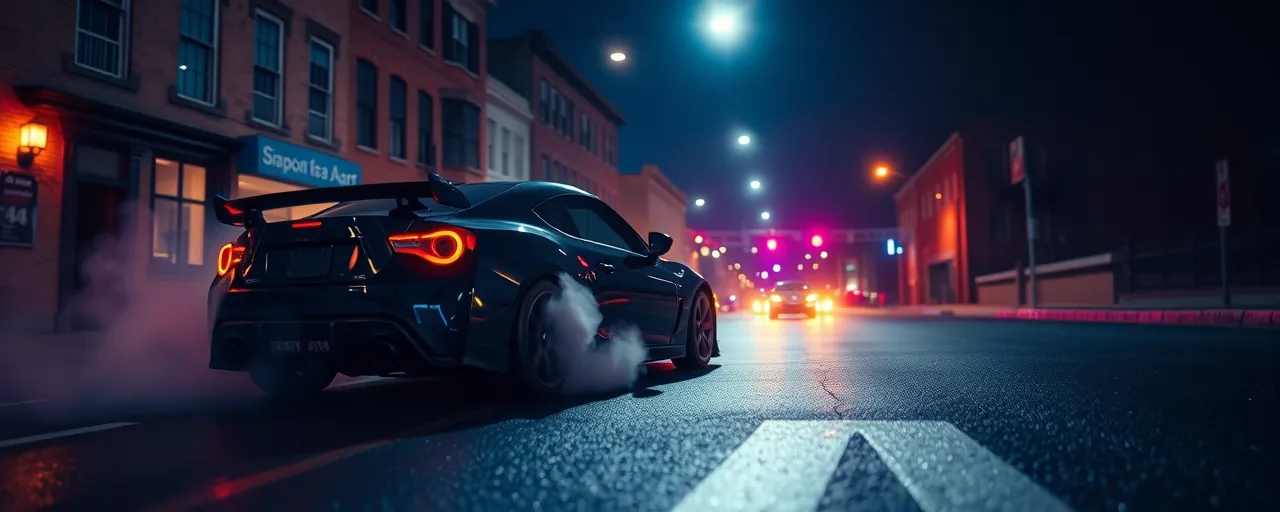Tires Screech, Tempers Flare
In Detroit’s quiet neighborhoods, the roar of engines shatters the night. Illegal street racing and drifting, where drivers whip cars into controlled spins, have spiked near major intersections and Detroit City Airport. Residents, fed up with the noise and danger, cheer a police crackdown that’s towing vehicles and breaking up crowds. But for car enthusiasts, the heavy-handed response highlights a deeper issue: nowhere legal to pursue their automotive passion.
The frustration is palpable. Locals lose sleep and worry about reckless drivers endangering lives. Research ties urban noise to stress, heart issues, and cognitive strain, especially for kids and seniors. Detroit’s task forces aim to restore peace, yet some community members argue that punishing drivers without offering alternatives only buries the problem temporarily.
Police Hit the Gas on Enforcement
Detroit’s police mean business. Roughly 100 officers per shift patrol racing hot spots, ticket spectators, seize cars, and even track participants to nearby suburbs for follow-ups. The goal is clear: make illegal racing too risky to attempt. Studies support this tactic, showing that high-visibility crackdowns can cut disorder by up to 39 percent in targeted areas by making lawbreakers think twice.
But quick fixes fade fast. Data suggests that without ongoing patrols or community efforts, the problem creeps back. Detroit’s auto industry roots make the issue trickier, a city synonymous with cars now wrestling with how to manage their thrill-seeking fans. Police promise sustained action and outreach, but skepticism lingers about whether arrests alone can shift the culture.
Enthusiasts Crave a Legal Outlet
Car enthusiasts feel trapped. With no designated tracks or drift parks in Detroit, public streets become their stage. Private garages like Gearhead Workspace provide tools and space, but steep fees and limited spots exclude many. Advocates look to cities like Atlanta, where organized track nights draw street racers to legal venues, and urge Detroit to repurpose vacant lots for sanctioned motorsport events.
Community-driven solutions also gain traction. Places like Seattle pair law enforcement with racetracks for discounted track days and driver mentorship, guiding young enthusiasts toward safe outlets. Detroit’s leaders have floated similar ideas, but progress stalls without firm commitments. Enthusiasts want their hobby respected, not criminalized.
Weighing Safety Against Passion
Detroit’s struggle mirrors a universal tug-of-war: public safety versus cultural expression. Residents need quiet, secure streets, a priority backed by studies linking noise reduction to better health and happier communities. Meanwhile, enthusiasts, tied to Detroit’s car-making legacy, demand spaces to celebrate their craft legally. The crackdown eases some risks, but without alternatives, tensions simmer.
Past efforts elsewhere offer warnings. New York’s 1990s push to curb minor offenses cut crime but strained community trust over heavy-handed tactics. Detroit risks a similar divide if it leans too hard on enforcement. Programs like youth auto workshops or public-private track partnerships could align safety with opportunity, building bridges instead of walls.
Paving a New Path Forward
Detroit faces a choice. Its beefed-up patrols have quieted some streets, but the lack of legal racing spaces keeps the issue alive. Cities that blend enforcement with prevention, like Orlando’s track mentorship programs, show a way forward. Detroit could tap its automotive heritage, partnering with car clubs and businesses to create drift parks or sanctioned race nights.
Both residents and enthusiasts share a goal: a city that’s safe and alive with passion. Meeting that vision means hearing the exhausted parent and the gearhead dreamer alike. With smart collaboration, Detroit can protect its streets while honoring its car culture, turning conflict into community.
No solution comes easy, but progress is possible. By investing in legal venues and outreach, Detroit can write a new chapter, one where safety and enthusiasm coexist, proving the city can still lead the way in all things automotive.
